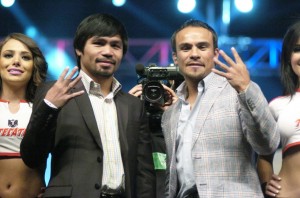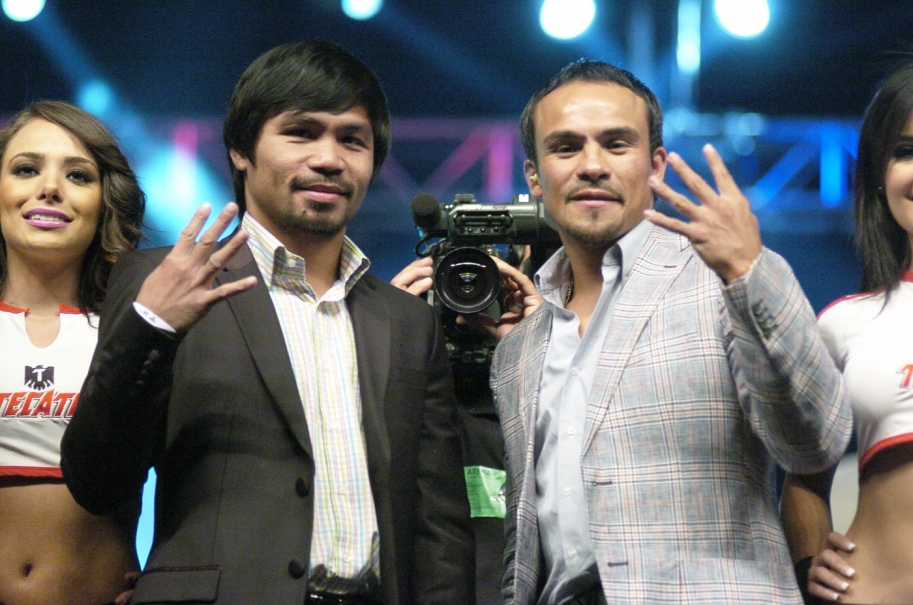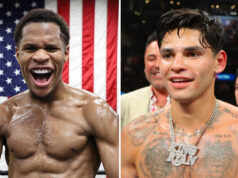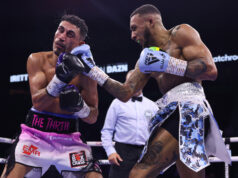Living in Europe as I do, I sometimes find it necessary to settle for a fight replay rather than see the event live, especially when that event is staged in the western time zones of the United States. So it was that I was watching the replay of Timothy Bradley vs. Manny Pacquiao, and upon seeing the results, my first thought was “Pacman got nailed by the de la Hoya curse!” With Manny Pacquiao going into a fourth fight with Juan Manuel Marquez, a man who many think was shafted in two of three encounters with the Filipino dynamo, the question of whether Pacquiao now has Oscar’s old curse hanging around his neck becomes very pertinent indeed.
Oscar de la Hoya: Victim of Overcompensating Judges
The idea behind the overcompensation curse is a simple one. Judges are as sensitive to allegations of corruption and incompetence as anyone, and sometimes when charges of such wrong-doing in regards to a particular fighter become loud enough, they swing the pendulum back the other way, bending over backwards to appear “impartial.” Ironically, the result of this overcompensation is yet more incompetence, as the judges go from shafting the opponents of a given big-name fighter to shafting the fighter himself.
The best modern example of the overcompensation curse is Oscar de la Hoya. In the late 1990s, anti-Oscar pundits (and there were a lot of them back then) thought the Golden Boy was getting too much love from the judges, and in particular they hated the outcomes of his first pair of big welterweight fights: 1997’s chess game with Pernell Whitaker, and 1999’s clash with Ike Quartey. Mind you, few or none of these pundits thought de la Hoya actually lost the fight against Whitaker. Instead, they took issue with the large scorecard margin de la Hoya received in that win. Instead of treating the matter of this skewed scoring as part of a general problem in boxing (which it was, is, and probably will continue to be), they screamed foul and corruption, alleging that de la Hoya could never lose a fight in Las Vegas.
Low and behold, the boxing judging community actually reads what the boxing press said about them, and responded. When de la Hoya fought Felix Trinidad in 1999, Las Vegas robbed the Golden Boy and gave the win to Tito, in what remains the most controversial fight of the late 1990s.
The overcompensation did not end with Trinidad. Oscar’s first loss to Shane Mosley was legit, but the scoring for his grudge match with Fernando Vargas was a joke. The Shane Mosley vs. Oscar de la Hoya rematch was very close, and a fight Oscar might have won, but not if you ask the judges.
True, Oscar de la Hoya received a major gift when he faced German middleweight titlist Felix Sturm in 2004, but Sturm was basically an unknown guy from Europe at that point in his career. The bottom line is that after his Split Decision win over Quartey, whenever de la Hoya faced another marquee opponent the judges bent over backwards to seem fair to the other guy. That was unfair to Oscar, and any child can tell you, two wrongs don’t make a right.
Pacquiao and the Overcompensation Curse

In the case of Manny Pacquiao, the origin of his overcompensation curse is rooted firmly in Juan Manuel Marquez. In 2008 and 2011, Marquez came up on the losing side of two very close contests. I cannot believe that the furor that erupted over the Pacquiao vs. Marquez rubber match in particular did not affect the judges who scored Pacquiao’s very next fight, June’s contest with Timothy Bradley.
The irony this time was that the smug pundits weren’t half-pleased, as they were when Trinidad was given his gift victory over Oscar de la Hoya. Instead, there was widespread disgust and outrage at the Bradley vs. Pacquiao decision. Nonetheless, it is clear that Pacquiao lost to Bradley because he was perceived as having received too many favors against Marquez.
The conventional wisdom for the fourth installment of Pacquiao vs. Marquez is that JMM, the reigning King of Mexican Boxing, needs a knockout to win. I don’t know if that’s necessarily true. On the one hand, the judges might feel that the scorn directed at the Bradley decision wipes the slate clean. On the other hand, they might remember the reason people were saying “Pacquiao can’t lose a decision in Vegas” is because of the previous two Pacman vs. Dinamita fights.
I put the odds on the overcompensation curse still hanging around Pacquiao’s neck as about 50-50, and if that is the case, he had better beware. With that curse hanging off of Pacquiao, all Juan Manuel Marquez needs to do is stay in the fight to win a decision this time around.











